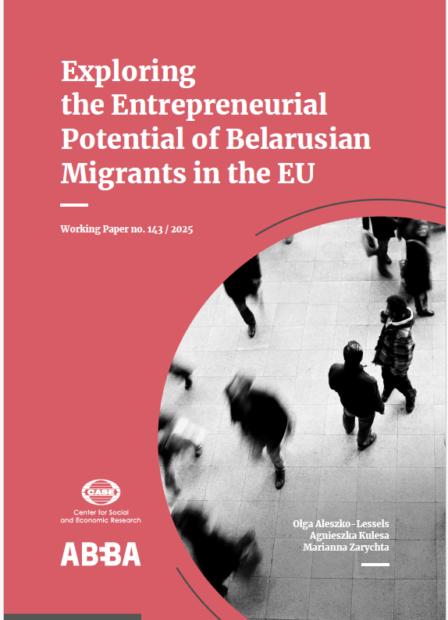
Exploring the Entrepreneurial Potential of Belarusian Migrants in the EU
This Working Paper aims to deepen the understanding of Belarusian migration to the EU, with a particular focus on entrepreneurship among Belarusian migrants.
acf domain was triggered too early. This is usually an indicator for some code in the plugin or theme running too early. Translations should be loaded at the init action or later. Please see Debugging in WordPress for more information. (This message was added in version 6.7.0.) in /home/case/domains/case.dev10.pro/public_html/web/wp/wp-includes/functions.php on line 6121 Homepage CASE
Homepage CASE
Selected values

Education:
PhD studies, Warsaw School of Economics, Collegium of Socio-Economics
MA, Political Science, University of Wrocław
Languages:
Polish (native), English (fluent), French (intermediate), Russian (basic)
Agnieszka Kulesa is a political scientist and migration policy expert with over 13 years of experience in research, project management and team leadership. Her work focuses on labour markets, international migration and migration policy. Currently a Lead Consultant at Ecorys Poland, she worked as an economist at CASE – Center for Social and Economic Research between 2018 and 2024, and as Vice President of the CASE Management Board from 2021. She also worked at the Institute of Public Affairs in Warsaw (2017-2018), including as Head of the Migration Policy Programme, and at the Migration Policy Department of the Polish Ministry of the Interior (2010-2014), where she was responsible for international cooperation in the field of migration and coordinated activities within the Prague Process.
Agnieszka holds a PhD in Political Science from the Warsaw School of Economics. She has published extensively and led various migration and labour market research projects for institutions such as the European Parliament, the European Commission, the Committee of the Regions and the European Economic and Social Committee.
She has been a panellist at events organised by Polish and foreign public and private institutions and regularly provides commentary for the media (e.g. Rzeczpospolita, Newsweek, Financial Times, BBC).
You're now part of a community that values [your newsletter's focus]. Get ready to stay informed, inspired, and engaged with our carefully curated content.